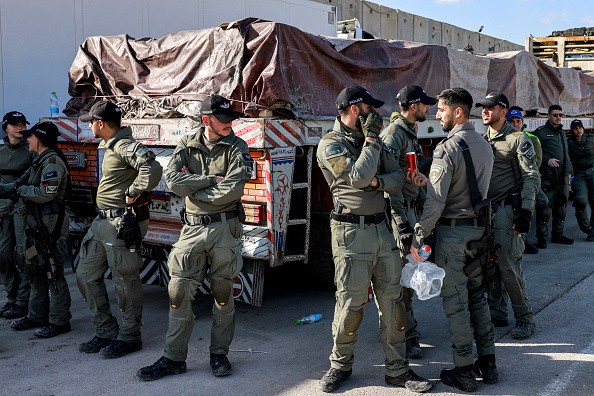Hours after Prime Minister Benjamin Netanyahu rejected Hamas' ceasefire terms, Israel turned on the assault, launching a barrage of airstrikes and killing over a dozen people overnight and into Thursday in Rafah.

Rafah is situated along the Egyptian border, with more than half the population in Gaza having fled there. It also serves as a main entry point for humanitarian aid. Egypt has repeatedly warned that any ground operation or mass displacement across the border would undermine its four-decade-old peace treaty with Israel.
The Associated Press reported at least 13 Palestinians dead, including two women and five children, according to the Kuwaiti Hospital who had received the bodies. Palestinian residents used their cellphone flashlights at the scene of one of the strikes as they dug through the rubble with pick-axes and their bare hands.
"I wish we could collect their whole bodies instead of just pieces," said Mohammed Abu Habib, a neighbor who witnessed the strike.
Israel has led an intense air and ground offensive in Gaza, killing over 27,000 Palestinians, driven most people from their homes, and pushed a quarter of the population toward starvation since the war began four months ago.
Netanyahu has declared the offensive will continue and expand until "total victory" against Hamas is achieved. Israel has also vowed to bring back the over 100 hostages still held by Hamas after most of the other captives were freed during a brief ceasefire in November in exchange for the release of Palestinians imprisoned by Israel.
According to the AP, Netanyahu said preparations are underway to expand the offensive into Rafah, where hundreds of thousands of Palestinians are crowded into slummy tent camps and overflowing U.N.-run shelters.
The Palestinian death toll has reached 27,840 in just four months and only continues to grow. Most of the victims are women and children. International aid organizations have warned that any major operation in Rafah would worsen what is already a major humanitarian catastrophe in the oppressed enclave.
"If they aren't killed in the fighting, Palestinian children, women, and men will be at risk of dying by starvation or disease," said Bob Kitchen of the International Rescue Committee. "There will no longer be a single 'safe' area for Palestinians to go to."
Warda Abu Warda told AP she feels helpless.
"Where do we go after Rafah? Do we go to sea?" she asked.
She spoke to the outlet as relatives wept, bidding farewell to their loved ones outside the hospital where bodies from the overnight strikes were brought.
The United States, Qatar, and Egypt are trying to orchestrate another ceasefire agreement to ensure the release of remaining hostages. Hamas demands an end to the war, a full withdrawal from Gaza, and the release of hundreds of Palestinian prisoners.
Netanyahu has rejected the demands, calling them "delusional" on Tuesday. He reaffirmed Israel would never agree to any deal that leaves Hamas in partial or full control of the territory it has ruled since 2007.
How Is The United States Responding?
U.S. Secretary of State Anthony Blinken, who is visiting Israel, has begun to show optimism, stating an agreement was still possible and negotiations are still on the table. The step by Blinken is the latest sign of a growing divide between the two close allies.
However, a Hamas delegation arrived in Cairo on Thursday for more negotiations.
Families of the hostages are placing extreme pressure on Netanyahu and the wider public to bring them home, even if it requires a deal with Hamas.
At least one senior Israeli official has acknowledged that saving ther captives and destroying Hamas might be incompatible.
Hamas is holding over 130 hostages, but approximately 30 of them are believed to be dead. The group is allegedly holding the captives in tunnels underground and "using them as human shields" for its top leaders. Meanwhile, the Palestinian death toll worsens with each passing day.









